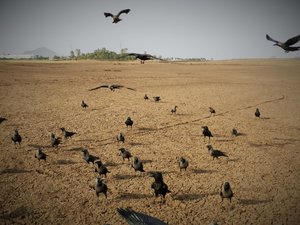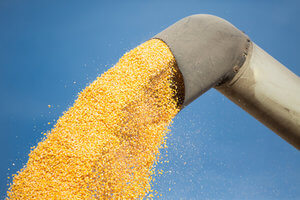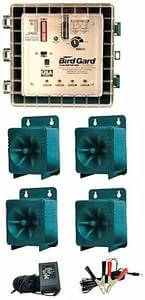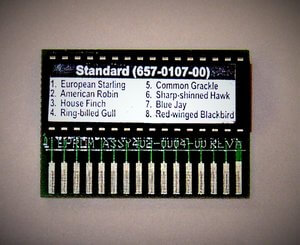This article explains how to repel crows. Specifically, it explains how to repel crows away from cornfields, as these crops are where crows typically cause the most problems.
However, the recommendations provided in the article for repelling crows are also applicable to farms and other types of crops and situations where crows and rooks are a problem.
But, before explaining how to repel crows, it is important to understand their most important characteristics, their habitat, and feeding habits…
Before Repelling Crows, What Are Their Main Characteristics?
The crow, whose Latin name is “Corvus Corax”, is a large bird with black plumage, a strong, slightly curved beak, also black in color. Crows can reach a size of more than 60 cm in length and up to 1.5 kg in weight.


The crow is a resident bird in Spain. Although it prefers coastal areas, crows can be found in all parts of the country. They inhabit both urban and agricultural and livestock areas.
In some of these areas, crow populations have increased so much that they have become a real plague, destroying crops, especially cornfields. They even display very aggressive behavior, attacking livestock, mainly newborn lambs.
The feeding habits of crows
Crows are omnivores. That is, they can feed on insects, animals, fruits, cereals, etc. They adapt their diet to the food availability in the area. Among the cereals preferred by crows is corn.
About corn cultivation

In the humid regions of Northwestern Iberian Peninsula: Galicia, Asturias, Cantabria, and the Basque Country, corn is mainly grown by livestock farms that use corn for grain, forage, and animal feed: sheep, pigs, cows,…
In inland areas such as Castilla-León, Aragón, Castilla-La Mancha, Extremadura,… we find larger corn farms, with more hectares of crops.
Corn is planted from late April to late May. From the moment of planting, crow, rook, and magpie attacks are a danger to cornfields. As we can see in this video, crows dig up and eat the seeds, even before the plant has sprouted.

If all goes well, the corn harvest usually takes place in the months of October and November. And we say, if all goes well, because there are more and more cases of farmers who suffer crow attacks on their corn plots during the summer months, from June to September.
Another animal that frequently attacks cornfields is the wild boar. If in your case, you have problems with wild boars destroying your crops, we recommend the article “How to Repel Wild Boars. Homemade Tricks and Professional Solutions“, where you will find good advice to protect your crop from wild boar attacks.
How to repel crows from corn crops
The most effective solution to repel crows is the BirdGard Pro Crow Repeller with chip #49, which works with audible sounds.
This crow repeller covers up to 6,000 m2. If you need more coverage, there are more powerful Bird Gard crow repeller models available:
- BirdGard Pro Plus #49 against crows – covers up to 12,000 m2. That is: 1.2 hectares.
- BirdGard Super Pro #49 against crows – covers up to 24,000 m2. That is: 2.4 hectares.
- BirdGard Super Pro Amp #49 against crows – covers up to 120,000 m2. That is: 12 hectares.
Main features of Bird Gard Crow Repellers
All these crow repellers have the following features:
- Weather-resistant. They are specially designed for outdoor use.
- BirdGard Crow Repeller sounds do not affect livestock or pets. Domestic animals and livestock quickly become accustomed to the sounds of the BirdGard crow repeller and are not affected by them.
- 30-day money-back guarantee, if you are not satisfied with the results obtained. We have many years of experience with these devices and know that they are very effective in repelling crows. This money-back guarantee is a way to convey that confidence to you.
- Very easy installation. You can do it yourself. No specialist technician is required.
- Fully programmable, with volume settings, sound combinations, and operation mode for day, night, or 24 hours. They include different functions that randomly vary the sound, sound duration, and the time interval between sounds.
- Crows do not get used to the sounds. You can use the device continuously, year after year. The sounds are emitted randomly and in a completely random pattern. In addition to chip #49 against crows, we have several additional crow chips in our catalog, such as chip #86 and chip #171. In some cases, it may be necessary to alternate these chips to achieve greater effectiveness in repelling these intelligent birds.
- Environmentally friendly and harmless to birds. Bird Gard bird repellers repel crows economically and effectively, without harming birds or the environment, in a natural way.
Crow Sound Chips
Chips #49, #86, and #171 are specifically designed to repel crows. Each chip contains a combination of 8 different sounds, including distress calls from these birds and predator sounds. When crows hear them, they believe there is danger and immediately move away from the area.
Success Stories: How to Repel Crows
- Floren, a cattle farmer in Udabe (Navarra), explains in this article how he manages to protect corn from crows. Floren has 23 hectares of corn, which he uses to feed his livestock.
- Mamen Sánchez shares her experience of how they got rid of crows that entered the warehouse the company has in an industrial park near Zaragoza.
- The multinational company Filstone explains how they managed to eliminate the presence of crows in their 40-hectare quarry in Portugal, using Bird Gard Super Pro Amp bioacoustic repellers.
How to Repel Crows – Conclusions
If necessary measures are not taken to repel crows, the economic repercussions of crow infestations in agriculture are enormous. In some cases, farmers have to re-fertilize and re-seed. This generates, in addition to an economic cost, a delay in the harvest. Some farmers estimate that economic losses caused by crows in cornfields exceed 1,000€ per hectare.
If you have any questions about how to repel crows, or which Bird Gard repeller is most suitable for repelling crows, jackdaws, or magpies, please do not hesitate to contact us. One of our technicians will advise you, free of charge and without obligation, on the most appropriate solution for your situation.

